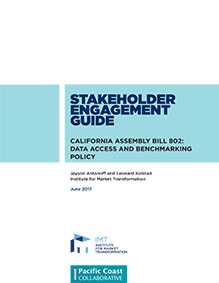A rulemaking process is underway at the California Energy Commission (CEC) to create regulations implementing the benchmarking and mandatory disclosure provisions of California’s Assembly Bill 802. The proposed regulations would require the owners of large commercial buildings to report building energy performance information to the CEC beginning in June 2018 and annually thereafter, and the owners of large residential buildings to report beginning in June 2019 and annually thereafter.
Prior to and for several years following the regulations going into effect, it is critical that affected stakeholders are informed about the goals of the law, and how to comply with the requirements. Engaging stakeholders early will help improve their understanding of the law and reduce confusion and concerns as compliance deadlines approach, resulting in greater acceptance of benchmarking. The regulations will affect a variety of stakeholder groups, including but not limited to building owners and managers, energy service providers, utilities, and tenants. Each group has an important and distinct role to play in the energy benchmarking process, and is therefore deserving of some level of attention in the outreach campaign.
This document serves to guide the CEC through the process of stakeholder engagement with a focus on what the Energy Commission should do throughout 2017, prior to the point when the regulations are finalized and approved, to prepare the relevant parties for compliance with the law. Since stakeholder engagement is an ongoing process that should continue well beyond that point, this plan also includes a brief description of some of the higher-level activities that the CEC should plan for after the regulations are finalized, as well as after the initial benchmarking reporting cycle. While the CEC may have some internal capacity to actively lead stakeholder engagement, this plan provides recommendations on key partners and contractors who can provide assistance in augmenting the efforts of CEC staff.
This paper was produced by IMT for the Pacific Coast Collaborative, which sets cooperative direction in key policy areas of mutual interest among North America’s West Coast jurisdictions including California, Oregon, Washington, and British Columbia.
